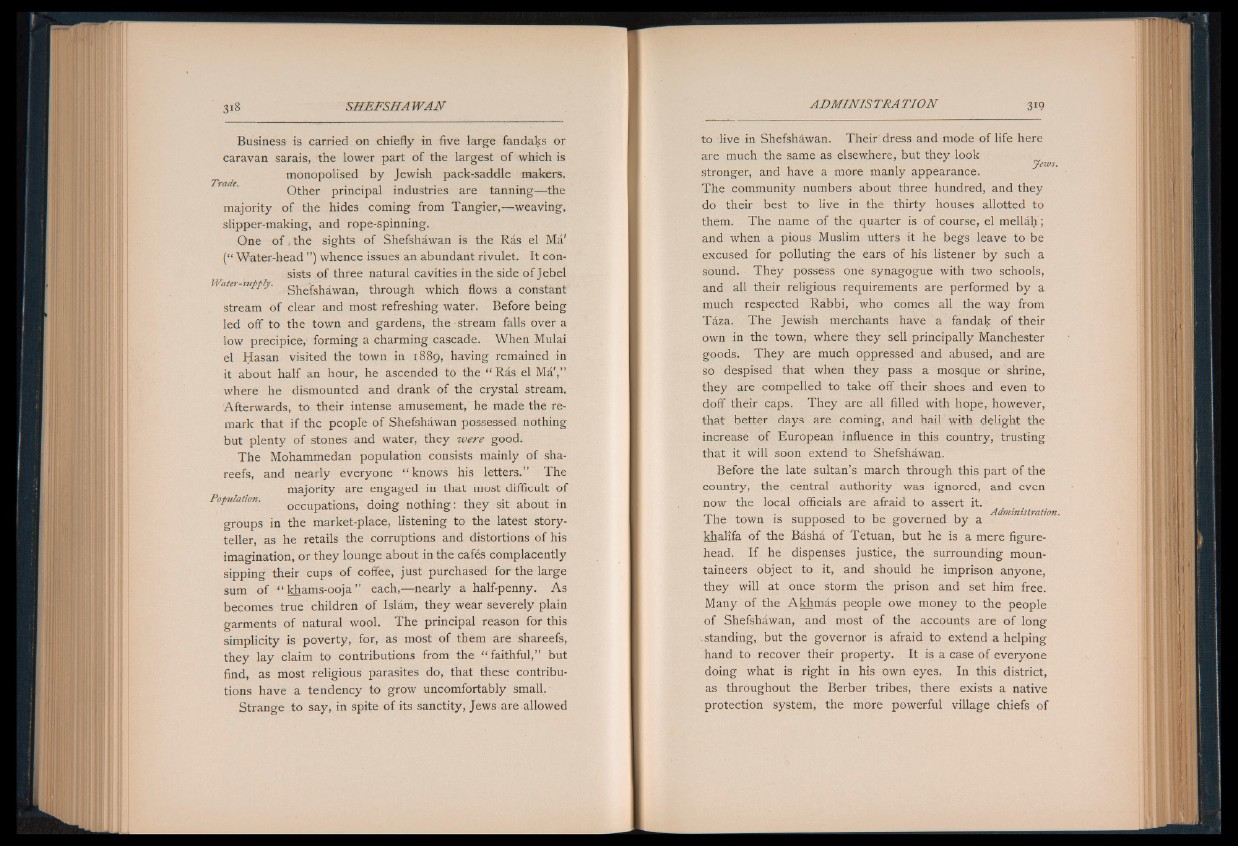
Business- is carried on chiefly in five large fandaks or
caravan sarais, the lower part of the largest of which is
monopolised by Jewish pack-saddle makers.
Other principal industries are tanning— the
majority of the hides coming from Tangier,— weaving,
slipper-making, and rope-spinning.
One o f , the sights of Shefsháwan is the Ras el Má'
(“ Water-head ” ) whence issues an abundant rivulet. It consists
of three natural cavities in the side of Jebel
Water supply. g j i e fsj1¿[w an ¡ through which flows a constant
stream of clear and most refreshing water. Before being
led off to the town and gardens, the - stream falls over a
low precipice, forming a charming cascade. When Mulai
el Hasan visited the town in 1889, having remained in
it about half an hour, he ascended to the “ Rás el Má',”
where he dismounted and drank of the crystal stream.
Afterwards, to their intense amusement, he made the remark
that if the people of Shefsháwan possessed nothing
but plenty of stones and water, they were good.
The Mohammedan population consists mainly of sha-
reefs, and nearly everyone “ knows his letters.” The
majority are engaged in that most difficult of
Population. occupations, doing nothing: they sit about in
groups in the market-place, listening to the latest storyteller,
as he retails the corruptions and distortions of his
imagination, or they lounge about in the cafés complacently
sipping their cups of coffee, just purchased for the large
sum of “ khams-ooja ” each,— nearly a half-penny. As
becomes true children of Islám, they wear severely plain
garments of natural wool. The principal reason for this
simplicity is poverty, for, as most of them are shareefs,
they lay claim to contributions from the “ faithful,” but
find, as most religious parasites do, that these contributions
have a tendency to grow uncomfortably small.
Strange to say, in spite of its sanctity, Jews are allowed
to live in Shefshawan. Their dress and mode of life here
are much the same as elsewhere, but they look
, , , Jews. stronger, and have a more manly appearance.
The community numbers about three hundred, and they
do their best to live in the thirty houses allotted to
them. The name of the quarter is of course, el mellah ;
and when a pious Muslim utters it he begs leave to be
excused for polluting the ears of his listener by such a
sound. They possess one synagogue with two schools,
and all their religious requirements are performed by a
much respected Rabbi, who comes all the way from
Taza. The Jewish merchants have a fandak of their
own in the town, where they sell principally Manchester
goods. They are much oppressed and abused, and are
so despised that when they pass a mosque or shrine,
they are compelled to take off their shoes and even to
doff their caps. They are all filled with hope, however,
that better days are coming, and hail with delight the
increase of European influence in this country, trusting
that it will soon extend to Shefshawan.
Before the late sultan’s march through this part of the
country, the central authority was ignored, and even
now the local officials are afraid to assert it.
, , , Administration. The town is supposed to be governed by a
khalifa of the Basha of Tetuan, but he is a mere figurehead.
If he dispenses justice, the surrounding mountaineers
object to it, and should he imprison anyone,
they will at once storm the prison and set him free.
Many of the Akhmas people owe money to the people
of Shefshawan, and most of the accounts are of long
standing, but the governor is afraid to extend a helping
hand to recover their property. It is a case of everyone
doing what is right in his own eyes. In this district,
as throughout the Berber tribes, there exists a native
protection system, the more powerful village chiefs of